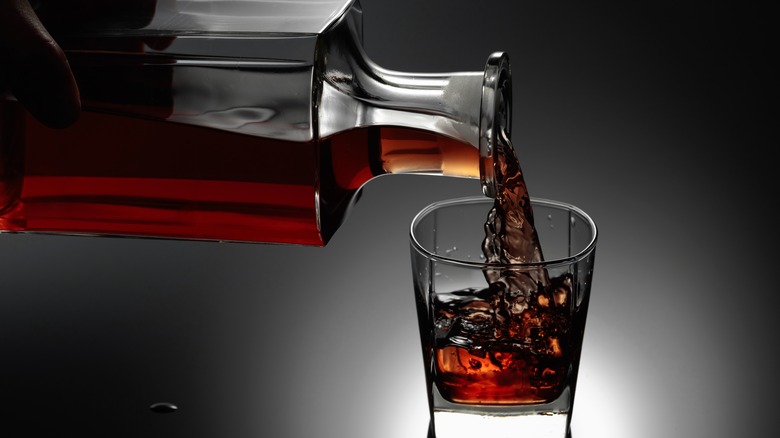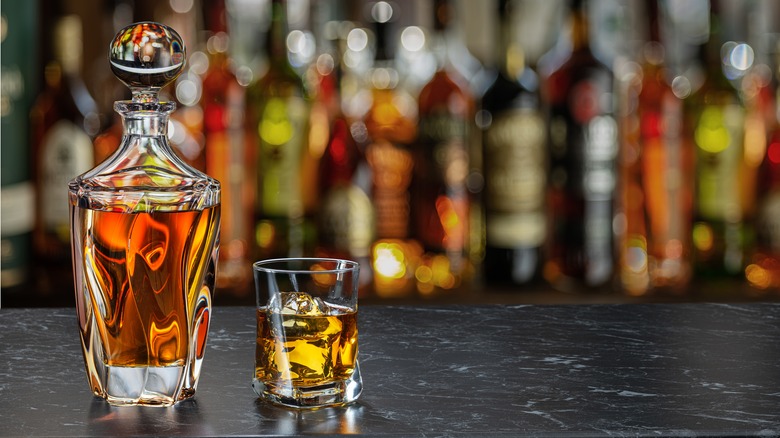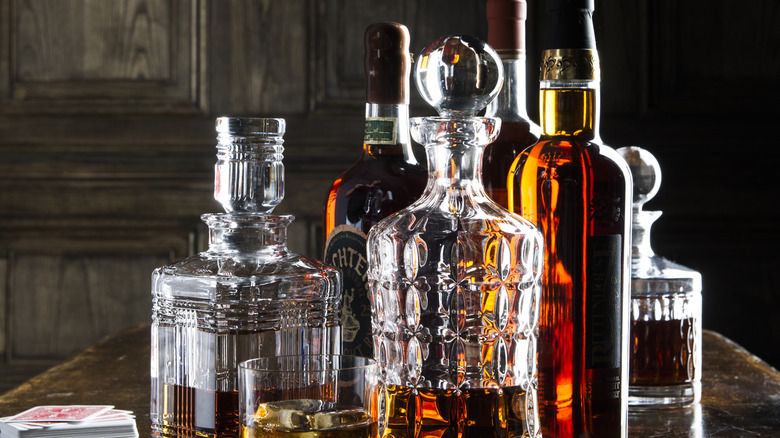Should You Be Decanting Your Whiskey?
Whiskey gives off a certain air of class and intrigue, which is often reflected on the big screen by characters like James Bond taking sips of the spirit between fighting off villains, or Officer K of Blade Runner downing a glass after hunting replicants. But should you add even more sophistication and decant your whiskey?
These vessels, typically made from glass or crystal, are an eye-catching way to store alcohol, typically wine, though some have started to try it with the spirit, too. So, does decanting whiskey help, or is it spoiling your hard-earned bottle of booze? In short, the experts say it's fine, though not necessary.
Decanting is known for improving wine by allowing it to breathe and remove sediments, but the same benefit doesn't really hold true with spirits. "Unlike wine, decanting whiskey won't change the flavor much," say Anna Axster and Wendelin von Schroder, co-founders of Lodestar Whiskey. But, they say, there's no harm in doing so. "If you've got a decanter you love and it looks awesome on your bar, go for it."
The science behind decanting
Whether you're thinking of decanting a favorite bottle, or something from a cocktail expert's must-buy whiskey list, there's no need to overly stress about it. Traditionally, decanters had a more practical origin, used to draw whiskey straight from the aging barrels. Although today, they are much more of a decorative choice for storing the spirit. "If your decanter has a good seal, you can store your whiskey in there for a long time, years even," according to Wendelin von Schroder and Anna Axster.
Unlike whiskey, the reason decanters are needed for wine is because the fermented grape drink can change drastically with time due to the tannins it contains, something that is found in very low levels in whiskey. Instead, the high alcohol content in whiskey (and lots of other popular spirits) means the likelihood of oxidation is low.
The only time you have to worry about your whiskey's quality lessening in a decanter is if you give it years to potentially spoil. Sitting in a half-empty decanter with lots of air exposure will only affect whiskey over an extended period of time. It's typically after about two years that you may begin to see some discoloration and degradation of flavor from your spirits.
Which whiskey decanter should you use?
Using a decanter for your whiskey can make at-home tastings a little more special and is just one of the many tools to level up your bar cart. And it doesn't matter how much money you've dropped on a particular variety of whiskey, either. "For us, decanting whiskey is all about the look and experience," say experts Anna Axster and Wendelin von Schroder. "Any whiskey you think is special deserves the fancy decanter treatment!"
If you've decided to take the leap and decant your whiskey, there are a few things to keep in mind when shopping for the perfect vessel, however. The shape of the decanter can range from square to globe, and everything in between, but the biggest thing to look for is a quality seal on the lid to help prevent oxidation and keep pests out. Whatever variety of decanter you choose, once you're done pouring with it, be sure to store it in a cool place away from direct sunlight.
The most important attribute of the decanter you purchase should be ensuring that it's lead-free. "We found out some crystal decanters have trace amounts of lead, and you definitely don't want that mixing with your whiskey over time," von Schroder and Axster share. This problem is typically found in antique crystal decanters,. but if you're unsure if your container has lead, don't use it more than a few days to store liquor.



